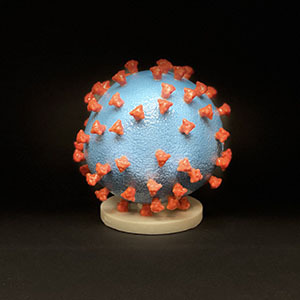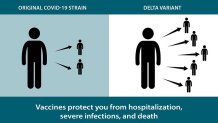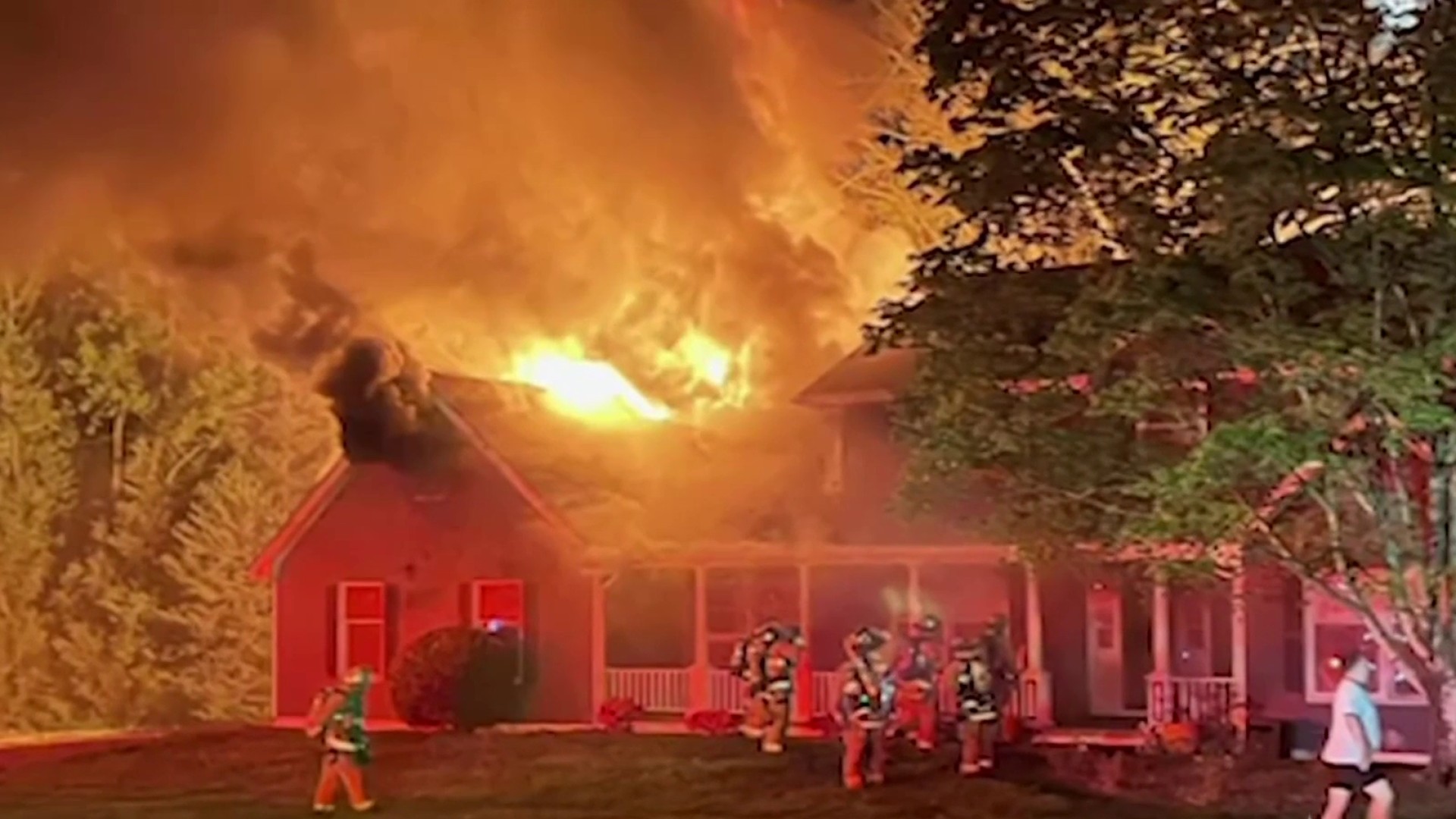Weekly COVID-19 cases in America are at pre-vaccine levels, and the delta variant is infecting not only adults, but thousands of children right as the new school year begins.
With the sudden surge, the Centers for Disease Control and Prevention made swift changes to its mask and vaccine guidance and it continues to release new information on a daily basis. Read below for an in-depth explanation of why the rules are changing and how to best protect yourself and others from the virus.
Have questions we didn't answer below? Tweet us @nbcwashington.
Why did the CDC change its guidance on masks?
We're making it easier for you to find stories that matter with our new newsletter — The 4Front. Sign up here and get news that is important for you to your inbox.
"Initially, when we were in around May or June, the situation on the ground was very different. The dominate strain, the alpha strain, was much less transmissible," Dr. Melissa Clarke, an emergency room physician, told News4. "It appeared at the time, based on the evidence, that vaccinated people did not spread the alpha variant of the virus as much, so they were encouraged to not wear masks in an effort to make it a win-win situation."
The delta variant changed all of that when, in late July, the CDC saw an alarming uptick in cases and hospitalizations around the country.
Local
Washington, D.C., Maryland and Virginia local news, events and information
By that time, millions of Americans were vaccinated, but new data showed the delta variant was more infectious than other variants — even in vaccinated people. That led the CDC to recommend everyone in areas of “substantial” or “high” transmission wear a mask in public indoor places, regardless of their vaccination status.
Map: DC-Area Counties Rated ‘High' COVID-19 Transmission Areas
Back up a bit. What are variants and how many are there?
All viruses change over time. Similar to how there are different strains of the flu, there are different strains, or variants, of the coronavirus.
The CDC compares a virus and its variants to a tree growing and branching out. Each branch on the tree is slightly different than the others. Some branches die off, while others get stronger and spread more widely.
Scientists have studied and identified variants since the start of the pandemic. Some variants allow the virus to spread more easily or make it resistant to treatments or vaccines. Those variants must be monitored more carefully, the CDC says.
A group of scientists the World Health Organization convened recommended using the Greek alphabet, i.e., alpha, beta, gamma, delta, lambda, etc. to make it easier for people to pronounce and discuss variants of interest and concern. The alpha variant that first appeared in the United Kingdom, the beta variant that was first identified in South Africa, the gamma variant that first surfaced in Brazil and delta, which first appeared in India are classified as variants of concern.
Lambda is another variant on scientists’ radar. Currently, WHO classifies it as a variant of interest.
To date, scientists have not identified any variants of high consequence in the United States.
What makes the delta variant so contagious?

The delta variant has quickly become the dominant strain of the virus in the U.S. because of mutations that allow it to infect more people, better evade the immune system and make its hosts sicker.
"Because the delta variant has mutations on the spike protein, changes that make it more transmissible, more able to infect someone and, actually, to reproduce faster,” Clarke said.
Each virus particle is covered in spike proteins, shown in red in the illustration above, that allow it to enter and infect human cells. More than 75% of the delta variant’s spikes are primed and ready to infect. With the alpha variant, more than 50% are able to infect, researchers have found.
Once delta infects someone, it gets to work in their respiratory tract, growing rapidly inside the throat and lungs.
“So, we have higher viral loads, which is just more virus in a person's system and, therefore, it makes it easier to pass it - even among people who are vaccinated," Clarke said.
People can also spread the virus to others whether or not they have symptoms, the CDC says.

Clarke said the alpha strain of the virus could infect around three or four people.
"For the delta variant, it's around six or seven people,” she said.
Is the delta variant more of a threat to children than previous variants?
More than 121,400 children tested positive for COVID-19 the past week from Aug. 5 to Aug. 12, a continuing substantial increase, according to the American Academy of Pediatrics. Children were 18 % of reported COVID-19 cases for that week.
After declining in early summer, child cases have steadily increased since the beginning of July, the AAP says.
"It appears that the delta variant is better able to not just infect you as a child or a young person, but also make you sicker. ... We've not only seen more cases going up, we've seen more hospitalizations going up nationwide,” Clarke said. “Actually, there are hospitals across the South, children's hospitals, that are saying they're actually taking care of more cases of children now than they have at any point during the pandemic.”
The CDC recommends all students and teachers wear masks inside the classroom, regardless of vaccination status.
“There is no debate that masks help to decrease the spread of the coronavirus,” Clarke said.
Why do I have to wear a mask in public if I’m vaccinated?
The risk of hospitalization or death is much lower if you’re vaccinated, but you can still contract the virus and pass it on to vulnerable, unvaccinated people, such as children under 12 and those with compromised immune systems.
“Although vaccines are highly effective, they are not perfect and there will be vaccine breakthrough infections,” the CDC says on its website.
By the end of July, there were at least 125,000 fully vaccinated Americans that tested positive for COVID-19. Doctors and experts said the delta variant drove those breakthrough infections.
Moderna says delta will lead to an increase in breakthrough infections among the fully vaccinated as people begin moving indoors for the colder months.
Wearing a mask is a simple way to help protect those around you who are still unable to get the vaccine and to prevent the virus from spreading further.
Which type of mask is best?
“The N95 masks and the KN95 masks are the gold standard,” Clarke said.
New research shows N95 and KN95 masks block 95% of particles when worn correctly, while a surgical mask offers 40% protection. A single layer cloth mask only provides about 20% protection.
Clarke says one way to get better protection for yourself and others is to double up with a surgical mask underneath a cloth mask.
Children should wear masks with adjustable ear loops and nose wires to help seal any gaps – keeping glasses from fogging up, and the mask from sliding down their faces.
If you hold your face mask into the sunlight and can see through it, you likely need to upgrade to a better material.
Visit the FDA’s website for a list of approved masks or this NBC News report for advice on choosing KN95 masks for kids.
Are the symptoms different for the delta variant?
The symptoms of the Delta variant appear to be the same as the original version of COVID-19. But doctors are seeing people getting sicker quicker, especially for younger people, health officials with the University of California, Davis said.
Vaccinated people who contract the delta variant of the virus are either asymptomatic or have very mild symptoms. Their symptoms can include cough, fever or headache, with the addition of significant loss of smell, according to UC Davis.
For more information on the delta variant, visit the CDC's website.
Doreen Gentzler and Patricia Fantis contributed to this report.



